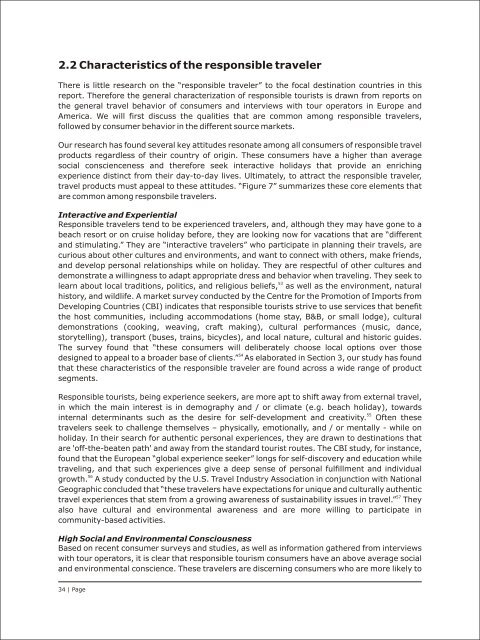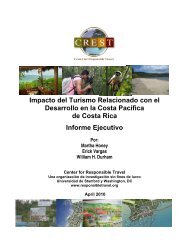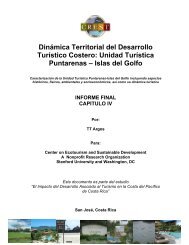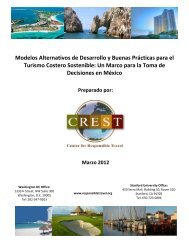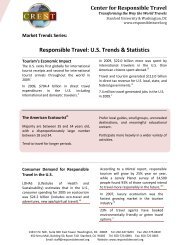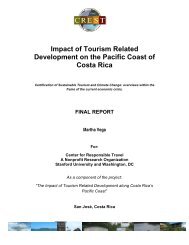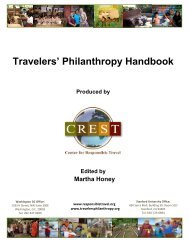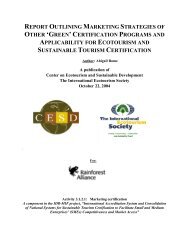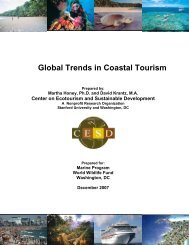The Market for Responsible Tourism Products - Center for ...
The Market for Responsible Tourism Products - Center for ...
The Market for Responsible Tourism Products - Center for ...
Create successful ePaper yourself
Turn your PDF publications into a flip-book with our unique Google optimized e-Paper software.
2.2 Characteristics of the responsible traveler<br />
<strong>The</strong>re is little research on the “responsible traveler” to the focal destination countries in this<br />
report. <strong>The</strong>re<strong>for</strong>e the general characterization of responsible tourists is drawn from reports on<br />
the general travel behavior of consumers and interviews with tour operators in Europe and<br />
America. We will first discuss the qualities that are common among responsible travelers,<br />
followed by consumer behavior in the different source markets.<br />
Our research has found several key attitudes resonate among all consumers of responsible travel<br />
products regardless of their country of origin. <strong>The</strong>se consumers have a higher than average<br />
social conscienceness and there<strong>for</strong>e seek interactive holidays that provide an enriching<br />
experience distinct from their day-to-day lives. Ultimately, to attract the responsible traveler,<br />
travel products must appeal to these attitudes. “Figure 7” summarizes these core elements that<br />
are common among responsbile travelers.<br />
Interactive and Experiential<br />
<strong>Responsible</strong> travelers tend to be experienced travelers, and, although they may have gone to a<br />
beach resort or on cruise holiday be<strong>for</strong>e, they are looking now <strong>for</strong> vacations that are “different<br />
and stimulating.” <strong>The</strong>y are “interactive travelers” who participate in planning their travels, are<br />
curious about other cultures and environments, and want to connect with others, make friends,<br />
and develop personal relationships while on holiday. <strong>The</strong>y are respectful of other cultures and<br />
demonstrate a willingness to adapt appropriate dress and behavior when traveling. <strong>The</strong>y seek to<br />
53<br />
learn about local traditions, politics, and religious beliefs, as well as the environment, natural<br />
history, and wildlife. A market survey conducted by the Centre <strong>for</strong> the Promotion of Imports from<br />
Developing Countries (CBI) indicates that responsible tourists strive to use services that benefit<br />
the host communities, including accommodations (home stay, B&B, or small lodge), cultural<br />
demonstrations (cooking, weaving, craft making), cultural per<strong>for</strong>mances (music, dance,<br />
storytelling), transport (buses, trains, bicycles), and local nature, cultural and historic guides.<br />
<strong>The</strong> survey found that “these consumers will deliberately choose local options over those<br />
54<br />
designed to appeal to a broader base of clients.” As elaborated in Section 3, our study has found<br />
that these characteristics of the responsible traveler are found across a wide range of product<br />
segments.<br />
<strong>Responsible</strong> tourists, being experience seekers, are more apt to shift away from external travel,<br />
in which the main interest is in demography and / or climate (e.g. beach holiday), towards<br />
55<br />
internal determinants such as the desire <strong>for</strong> self-development and creativity. Often these<br />
travelers seek to challenge themselves – physically, emotionally, and / or mentally - while on<br />
holiday. In their search <strong>for</strong> authentic personal experiences, they are drawn to destinations that<br />
are 'off-the-beaten path' and away from the standard tourist routes. <strong>The</strong> CBI study, <strong>for</strong> instance,<br />
found that the European “global experience seeker” longs <strong>for</strong> self-discovery and education while<br />
traveling, and that such experiences give a deep sense of personal fulfillment and individual<br />
56<br />
growth. A study conducted by the U.S. Travel Industry Association in conjunction with National<br />
Geographic concluded that “these travelers have expectations <strong>for</strong> unique and culturally authentic<br />
57<br />
travel experiences that stem from a growing awareness of sustainability issues in travel.” <strong>The</strong>y<br />
also have cultural and environmental awareness and are more willing to participate in<br />
community-based activities.<br />
High Social and Environmental Consciousness<br />
Based on recent consumer surveys and studies, as well as in<strong>for</strong>mation gathered from interviews<br />
with tour operators, it is clear that responsible tourism consumers have an above average social<br />
and environmental conscience. <strong>The</strong>se travelers are discerning consumers who are more likely to<br />
34 | Page


